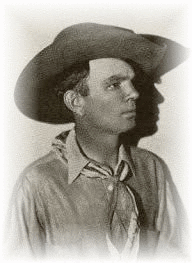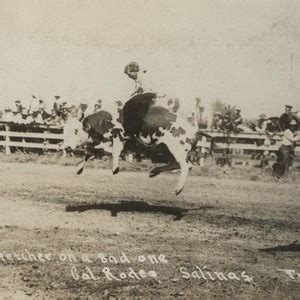Each year in September, the Laws Museum and Historical Site honors the life of Curley Fletcher at its "Good Ol' Days" celebration, a three day weekend event including a dinner concert on Friday evening; Performances, Art, Crafts, Food, and rides on the Death Valley Brill Car all day on Saturday at the museum grounds; and finishing with a visit to Curley's gravesite on Sunday morning.

Carmen William "Curley" Fletcher was a local Owens Valley writer and poet, whose literature had a profound impact, not only in his lifetime, but is remembered and recited around the world today, and certainly will be for many years in the future. Curley was born in San Francisco on September 22, 1892 and in his infancy soon arrived at the town of Laws with his parents, William Henry "Harry" Fletcher Sr., an english sailor, and his wife Benedetta Rossi, an immigrant from Italy.
Curley's poem, The Strawberry Roan, stands out among his many works as a classic, having been set to music by “Tamale Joe”, aka Edward William Hargatt, and made famous by the legendary performer Marty Robbins. The story of this song is told by Mick Holder of the Globe Miami Times:
"Curly Fletcher was a showman and early promoter of western ‘performance productions’- the early harbinger of modern rodeos. But his passion was poetry and that is how he would often refer to himself- as a poet. His work, and his passion took him all over the country and he often found himself in Globe. He and his brother, were in fact, the first promoters of the Gila Valley Winter Stampede. He would perform his poems at these 'performance events'and the poem which became a famous song was originally titled 'The Outlaw Broncho' (original spelling). It was published in the Arizona Record in December of 1915, and later published as part of a collection in 1917, 1926 and 1931."
 Fletcher's collection of poems, Songs of the Sage, was published in 1931 and reprinted in 1986 by Peregrine Smith Books with a preface by Hal Cannon, founder of The Western Folklife Center. Curley Fletcher claimed Bishop his "hometown" throughout his lifetime, where he grew up with his three brothers and two sisters.
Fletcher's collection of poems, Songs of the Sage, was published in 1931 and reprinted in 1986 by Peregrine Smith Books with a preface by Hal Cannon, founder of The Western Folklife Center. Curley Fletcher claimed Bishop his "hometown" throughout his lifetime, where he grew up with his three brothers and two sisters.
He had numerous occupations, including cowboy/cowhand, mineral prospector, poet and champion rodeo rider, but also spent a portion of his life traveling throughout the country and in places like Hollywood and Las Vegas as a film actor, musician, publisher and advisor.
He appeared in the 1947 movie, Gunsmoke, as a rancher.
After his death of September 5, 1954 he was buried at Bishop Pioneer Cemetery on West Line Street near Poleta.
